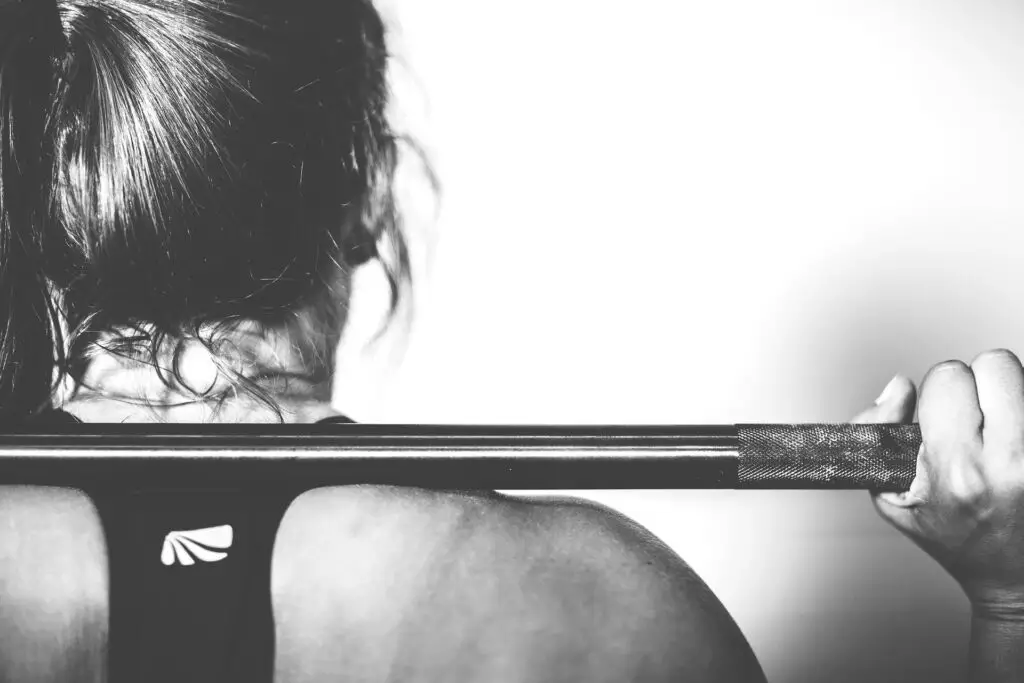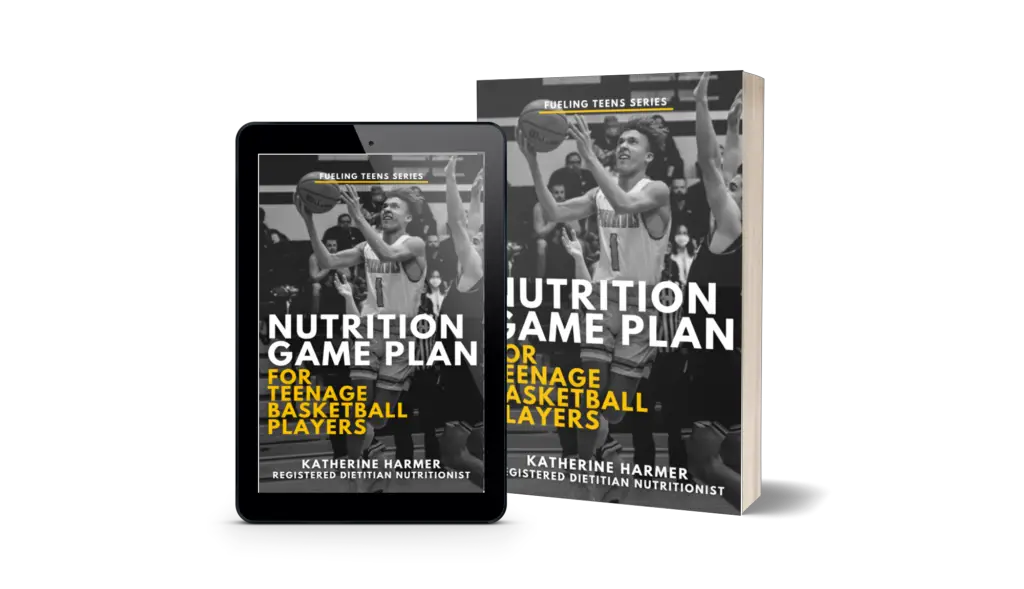You might feel too scrawny for basketball, or you might want to be a little stronger on the court. Either way, teen basketball players want to feel big, strong, and powerful compared to their competition. It’s usually the tall, skinny kids that are the ones that need to play physically in the paint and might benefit from more weight to throw around.
Growth spurts can happen at interesting rates, meaning many teens are scrawny or lanky at different times through the teen years while they catch up to their height. Basketball players who want to gain weight during this time can follow simple tips to healthily hit their goals. The best way for these teens to gain weight is to eat 300-500 extra calories per day, eat every 3-4 hours, never skip meals, exercise regularly and include strength training, and get 15-30 grams of protein at every meal and snack.
This post will highlight and describe ideas for weight gain for healthy teen basketball athletes. Keep reading below to see what you need to be doing TODAY that will make all the difference.

How Should a Basketball Player Gain Weight?
If you want to gain weight for basketball, where do you look for tips? A quick internet search will give you some tips for bulking up with extra protein, some forums with personal stories and wacko advice, ideas for weight training, and a few sports websites for specialized tips. If you want to gain weight THE RIGHT WAY (aka the healthy, realistic, and effective way) you’ll start here and get your tips from a Registered Dietitian Nutritionist- a food and nutrition expert.
Tips For Gaining Weight For High School Basketball Players:
Talk with your coach, your parents, and your doctor before deciding you need to bulk up for basketball. Make sure your goals are appropriate, healthy, and reasonable for your age. If it’s appropriate to be bigger for basketball, choose to gain muscle and not excess body fat.
To eat to gain weight and muscle, follow these tips:
Choose Nutrient-Dense Foods.
It’s not just about eating more, you’ll want to make sure you are eating foods that have a lot of nutrients. Looks for foods that are high in nutrition such as nuts, legumes, dairy products, eggs, whole grains, high-quality protein, fruits, and veggies, etc.
Eat Extra Calories
Plan to eat about 300-500 extra calories per day (that is 1-2 extra snacks per day). You can eat more, but then you’ll be storing extra calories as fat. If you’d like to mostly build muscle and lean body tissue, then you’ll want to gain weight steadily and slowly. Calorie recommendations are individualized based on age, sex, height, weight, exercise level, etc. but some teen athletes who need to gain weight may need around 3,000-4,000 calories per day. Calculate your estimated calorie level here based on gender, age, and activity level and then add 300-500 calories per day for weight gain. Meet with a healthcare professional to make sure this is an appropriate plan for you.
Eat Often
Eat at least 5-6 times per day– Eat 3 good sized meals with 2-4 snacks. If you have a smaller appetite, eat more often during the day. Don’t skip meals and eat at least every 3-4 hours. This means you’ll have to plan ahead for a day of nutritious meals and snacks. You might want to plan something for breakfast, a mid-morning snack, lunch, an afternoon (after school) snack, dinner, and maybe even an evening snack. Meals should be around 500-800 calories and snacks should be about 100-300 calories each. Focus meals and snacks on healthy carbohydrates (whole grains, fruits, starchy vegetables, legumes, and some dairy products), protein foods, and fruits and vegetables. You can choose to eat more calories and eat whatever you want, but junk food and fast food won’t provide much nutrition.
Drink Calories
You can get extra calories easily and quickly through beverages. It’s a smart idea to include liquid calories into your diet, but not from soda or sugary drinks. Choose milk, fruit smoothies, juice, chocolate milk, protein shakes, or sports drinks (when exercising).
Watch Your Beverages
Drink fluids mostly between meals (not with meals) to leave more room for food.
Boost Calories
Add higher-calorie foods to your meals, such as cheese, peanut butter, nuts, sour cream, salad dressings, oil, sauces, dips, dressings, or butter.
Switch to Whole Milk
Choose full-fat versions of foods and not “lite” or “low-fat” or “low-calorie”. Switching to 2% or whole milk is a great choice as well as regular-fat cottage cheese, dressings, snacks, and more.
Eat Healthy Fats
Fats are higher in calories per gram than protein or carbohydrates. Eating more healthy fat will help you gain weight. Lightly increase your intake of healthy fats such as olive oil, nuts, seeds, and avocados. Spread some avocado slices on your toast and sandwiches, bring trail mix for snacks, put seeds in your oatmeal and smoothies, etc.
Healthy Snacking Often
Keep a supply of favorite healthy snacks with you at all times. Great examples to keep with you in your backpack or bag are trail mix, granola bars, crackers, energy bars, and dried fruit.
It’s Not All About Protein
You need to be smart in how you plan to gain muscle for basketball. Muscle growth is a complex concept that requires more than just exercise or protein supplements. If your goal is to bulk up, remember that eating more protein doesn’t equal bigger muscles. To successfully build muscle you need to make sure you are eating enough calories and protein, and including regular strength training. Just adding extra protein to your diet will not help you build muscle. Most teens get plenty of protein, so the timing of the protein you eat is essential.
How Much More Protein?
Within 1-2 hours after exercise you should include some type of protein food or snack. Eat a balanced meal or snack that includes protein such as eggs, Greek yogurt, milk, meat, nuts, beans, cheese, or even an energy bar. Eat every 3-4 hours and be sure to include 15-30 grams of protein with each meal or snack. Protein bars and protein powders are not usually necessary unless you find it hard to eat anything else with protein at certain times of the day such as right after a workout.
For specific ideas for snacks check out my post The BEST Pre-Workout Meals and Snacks for a Teenage Athlete.
Know It Will Take Time
Good things take time, including building muscle and gaining healthy weight. If you are gaining about 0.5-1 pound per week or every 2 weeks- you’re right on track! You’re doing it wrong if you’re putting on lots of weight quickly. Gaining weight healthily and correctly will take time and you can never fully anticipate how your body will change through regular teenage growth spurts. Do your best with these healthy weight gain habits and your body will catch up as you get a little older and finish growing.
Want a personalized nutrition plan with more specific information? Check out my basketball ebook! It contains a 5-week meal plan, snack list, eating tips, how to gain or lose weight for basketball, and more. All from a Registered Dietitian Nutritionist. It’s 50+ pages of information on sale right now. Let me know what you think! Get more information here.

Who Should Gain Weight for Basketball?
Not all teens should try to gain weight just because they want to bulk up. Teens that are already a healthy weight may not need to follow these recommendations. Regular exercise and healthy eating can help healthy, normal weight teens gain muscle. Most teen basketball players should be working on gaining muscle, but not everyone needs to gain fat and muscle.
Teens who are underweight may need to gain weight in order to become stronger, healthier, and an improved athlete. Teenagers are classified as underweight based on growth patterns charted on a growth chart. Teens who are below the 5th percentile for body mass index (BMI) -for-age, gender, and height are classified as underweight. BMI is not a tool used to diagnose, but to screen for nutritional issues. You can use an online BMI calculator here.
Talk to your healthcare provider to see if your teen fits into the “underweight” category and has worrisome growth. Providers may not be worried because some teens are smaller and it’s perfectly normal for them. If your provider has expressed some concerns in your child’s growth, then it may be time to implement some weight-gaining strategies.
Check out my posts How Can I Tell if my Teen is Overweight? or What is a Healthy BMI for a Teenage Girl? for more information about BMI and weight classifications for teens.
Related Questions
How do NBA Players Build Muscle? It’s hard to compare yourself to those in the NBA. Professional athletes have personal trainers, nutrition experts, chefs, doctors, coaches, etc. all helping them to get to their top level of health and performance. It’s also their job and they dedicate their whole day to basketball and improvements. To build muscle, NBA players focus on eating the right amount of protein and dedicating a lot of time to weight training, especially focusing on building the right muscles that will help them on the court.
Does Basketball Make You Stronger? Yes, playing basketball regularly will make you stronger. It will help you build your endurance, energy levels, and overall performance. As you work on additional exercises off the court to build upper and lower body strength, increase endurance, strengthen core muscles, and boosting power, you’ll also be able to improve your basketball skills on the court.
What do NBA Players Eat Before a Game? Professional basketball athletes are focused on appropriately fueling themselves before a game. They plan their meal on a high amount of carbohydrates, a moderate amount of protein, and fluid. A PB&J sandwich, pasta, bagels, cereal, or oatmeal can be popular choices depending on the individual.
Is Basketball a Good Workout? Anything is a good workout that gets your heart and breathing rate up. Basketball is an awesome way to get in shape and burn calories because it involves running, jumping, passing, dribbling, and more at high intensity with short breaks.
See Also
- Nutrition Meal Plan for Teenage Basketball Players
- Best Supplements for Teenage Athletes
- What is the Best Diet Plan for a 15 Year-Old?
- How Many Carbs Does a 15 Year-Old Teen Need?
- The BEST Post-Workout Snacks for Teenagers – Dietitian Recommended!
Written by Katherine Harmer, Registered Dietitian Nutritionist
Fueling Teens is a participant in the Amazon Services LLC Associates Program, an affiliate advertising program designed to provide a means for sites to earn advertising fees by advertising and linking to Amazon.com. We also participate in other affiliate programs which compensate us for referring traffic.
